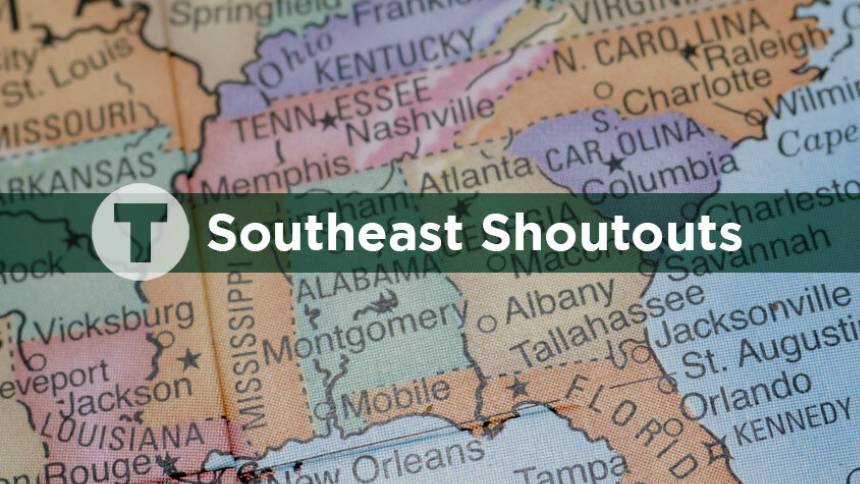
Southeast Shoutouts | Former Pepsi plant to become hub for Greenville entrepreneurs
A new accelerator and a new incubator that sounds like an accelerator are planned for two Florida cities.
From Greenville, SC:
Work is underway to convert a historic industrial building that once operated as a Pepsi-Cola plant in Greenville into a hub for entrepreneurs and business start-ups. The seven-acre site just outside Greenville was recently placed on the National Register of Historic Places, according to Sean Hartness, Chief Executive Officer (CEO) of Hartness Development.
The Crescent Startup Community, as the new facility is named, is set to open next spring, an innovation hub designed to connect entrepreneurs and new business owners with resources to sustain and grow their operations. Phase One is a 56,000-square-foot adaptive reuse project. Phase Two will include 150,000 square feet of newly built mixed-use space dedicated to innovation.
Flywheel Coworking, a Winston-Salem, NC-based company with five locations across the Southeast, will serve as the anchor tenant of the Phase One space. Furman University’s Hill Institute for Innovation and Entrepreneurship will also have a presence.
Between 200 and 300 entrepreneurs will operate in the membership-based workspace, about 40 percent of which likely will be business start-ups. Membership ranges from $50 to $700 a month.
From Birmingham, AL:
As Birmingham works to cement its growing national reputation as a center for healthcare innovation, a prominent healthcare business accelerator in the city is bringing in a new leader. Kellie Clark has been appointed Managing Director of the Prosper Healthtech Accelerator, a program aimed at making The Magic City a mecca for health technology solutions through investments in entrepreneurship, talent, and community engagements.
Prosper Healthtech Accelerator is a collaboration between venture capital platform gener8tor and the Birmingham region’s growth initiative, Prosper. Clark brings a broad range of experiences from previous roles, including CEO of Appthink, a platform that supports accelerators in emerging ecosystems with tools and frameworks, and Director of Programs at Birmingham’s Innovation Depot, where she served as Interim Managing Director of its Velocity Accelerator and spearheaded the creation of Voltage, Innovation Depot’s idea incubation program.
From Charlotte, NC:
The U.S. Department of Energy (DOE)’s Advanced Materials and Manufacturing Technologies Office (AMMTO) has renewed funding for PowerAmerica, DOE’s first Clean Energy Manufacturing Innovation Institute.
PowerAmerica will receive an initial $8 million, with potential funding across four more fiscal years to follow, to continue advancing domestic manufacturing of next-generation wind bandgap (WBG) semiconductors for power electronics to aid economy-wide decarbonization and electrification.
Launched in 2014, PowerAmerica has trained more than 400 masters and Ph.D. students, 300 short course attendees, 1,800 tutorial participants, and 9,000 K-12 students in science, technology, engineering, and mathematics (STEM) programs, including 2,000 participants in hands-on training. It has also commercialized more than 10 WBG technologies over five years. To date, 40 percent of PowerAmerica’s 60 projects have reached or are set to reach commercial status.
The University of Tennessee, Knoxville, and the Electric Power Research Institute are among the 89 member organizations listed on the website.
From St. Petersburg, FL:
The Tampa Bay Innovation Center has selected 10 companies for its artificial intelligence (AI) accelerator program that kicks off this week. Described as technology- and industry-agnostic, the accelerator is focused on start-ups with business-to-business (B2B) business models.
According to the website for the program, it is different from those that focus on preparing a start-up’s pitch, viral marketing, or raising money. “This program takes an ‘inside-out’ approach. We prepare your company not to just ‘look ready’ but to ‘be ready’ to attract revenue, hit the ground running, and execute your plan. Our program helps CEOs develop into leaders that can rapidly execute plans, adjust when appropriate, and give them the experience to know how to navigate obstacles that derail promising start-ups.”
It continues by explaining that, “While a good pitch will attract investors, the deal is closed based on your response to questions and successful due diligence. Having the confidence that you can handle the next phase of your startup will help close the deal with investors.”
Four of the participants call Florida home. The other six come from Delaware, Georgia, Missouri, New York (2), and Texas.
From Clearwater, FL:
Amplify Clearwater, a business advocacy organization, is partnering with Clearwater-based Economic Impact Catalyst to launch the first tourism business incubator in Florida. The announcement comes after the Clearwater City Council approved allocating $250,000 of “American Rescue Plan Act” funds to launch the incubator.
The program is set to launch its first 10-week cohort in October, followed by a second cohort in spring 2024.
From Research Triangle Park, NC:
What will be the first category of jobs lost to AI? As reported in this article from WRAL TechWire based on an interview that the Chair and CEO of IBM did with CNBC’s “Squawk Box Asia,” they will be back office white-collar workers. Emerging generative AI and large language models such as ChatGPT could “make every enterprise process more productive,” Arvind Krishna is quoted as saying. “That means you can get the same work done with fewer people. That’s just the nature of productivity. I actually believe that the first set of roles that will get impacted are — what I call — back office, white-collar work.”
Like what you've read?
Forward to a friend!

